Autobiography of Andrew Carnegie
Select Format
Select Condition 
Book Overview
Written in 1919 and published posthumously in 1920, 'The Autobiography of Andrew Carnegie' is a very well-written and intriguing history of one of the most affluent men in the United States, a leading... This description may be from another edition of this product.
Format:Paperback
Language:English
ISBN:155553001X
ISBN13:9781555530013
Release Date:October 1986
Publisher:Northeastern University Press
Length:375 Pages
Weight:1.13 lbs.
Dimensions:8.3" x 1.0" x 5.5"
Customer Reviews
3 ratings
Essential Reading in the History of American 19th Century Business
Published by Thriftbooks.com User , 19 years ago
Born in Scotland but an immigrant to the United States as a teenager, Andrew Carnegie has been variously characterized as a "captain of industry" or a "robber baron" by those who have chronicled his rise to wealth and fame in the latter nineteenth century. After selling his steel company to J.P. Morgan at the turn of the century, Carnegie devoted himself to philanthropic goals. He gave away more than $350 million to various causes and endowed more than 250,000 libraries. His philanthropic activities were underpinned by a fundamental belief in the virtue of hard work, perseverance, and self-improvement through education, hence his emphasis on libraries and the endowing of other educational organizations. Fundamentally, this book offers a restatement of the "Horatio Alger" myth of the "American dream" of success through personal commitment. At the same time Carnegie seeks to pass on his wisdom gained through a lifetime of effort. A significant and fascinating statement of American industrial individualism that is required reading for all who wish to understand the history of the United States in the latter nineteenth century, Carnegie's autobiography also served as a model for many others to follow. Unfortunately, few achieved the success that Carnegie enjoyed despite the diligence they may have registered.
Different than what I expected, but still a very rich book
Published by Thriftbooks.com User , 23 years ago
I'll admit that my primary motivation for reading this book was somewhat shallow--I basically wanted to read about how one of history's most successful businessmen amassed so much wealth. To be honest, the book didn't really give as many details as I would have liked on that particular interest. But what I got along the way made the book worth it.First and foremost, after reading 350 pages of Carnegie writing about his life you feel like you really start to know him, to get a sense of what kind of human being he was, and even to get a sense of his somewhat remarkable confidence level that exists in conjunction with his pretty inspiring level of benevolence and compassion. But I think even more than getting a sense of Carnegie, you get a sense of the time he lived in. Some of the most engaging parts of the book for me were the first-hand accounts of Lincoln during the Civil War, or Carnegie's conversations with President Harrison about a small uprising in Chile. You also hear about how he handled the strikes of steel workers, an occurence I'd only read about in history books but never learned directly about from the perspective of the manager.All throughout Carnegie peppers with his nuggets of wisdom, and you get the feeling he knows people want them really badly but that he chooses to give them sparingly. In the end, I probably will never re-read this book, but I feel better educated about one of history's greatest industrialists, greatest benefactors, and the time he lived in after having read it. If you have a nascent interest in history, you will most likely enjoy this book; if you're looking for a "how to make your millions" from a master, I would look elsewhere.
Essential Reading
Published by Thriftbooks.com User , 23 years ago
The vanity of today's uneducated society is breathtaking. White is black and black is white and 'a little knowledge' is indeed proving very dangerous. This book (along with the autobiography of Benjamin Franklin) should be read by every American citizen - to relearn what America once represented.For example, Carnegie Steel, the world's largest company in 1900, was NOT a corporation; it was a private partnership. The sale of the company to JP morgan (for half a billion dollars) was done on a handshake; a contract was a mere afterthought. Reputation and honesty and customer service were THE guiding principles of the era. 'Individual responsibility' was considered a good thing in those days.America now has more lawyers per capita than any other nation on Earth. Our politicians now attempt to micro-manage every detail of our lives. You break a fingernail and sue the universe. We have become terrified of freedom. Read this book if you want to understand how America rose from a third world country to a superpower between 1800 and 1900 - without government intervention or welfare or all the millions of rules and regulations we now hold so dear. We have traded away our freedom for security. The price is higher than you think.





